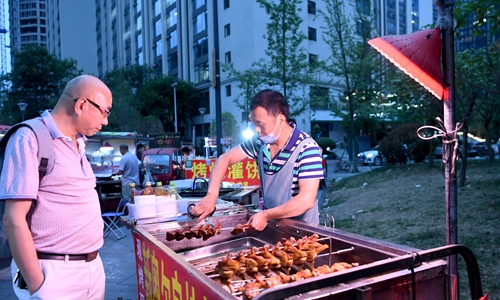Street vending economy setting new trends
By Yin Yeping Source:Global Times Published: 2020/6/4 21:30:56

A resident visits a barbecue stand on Tianfusanjie Road in Chengdu, Southwest China's Sichuan Province on Monday night. Chengdu was the first city in the country to loosen controls on the private stall economy on March 15. Photo: cnsphoto
As China's economy is recovering from the fallout of the coronavirus pandemic, the so-called vending economy is in the spotlight with groups and individuals from all walks of life participating. Experts said that the sector may provide employment for 9 million people this year if more support policies are put into place.
Big data shows that in the past seven days, the search popularity of relevant content such as "booth positioning skills" surged 665 percent year-on-year, reaching the highest level in 10 years, according to information that China's search engine giant Baidu.com sent to the Global Times on Thursday.
Meanwhile, toys, snacks, battery-chargers -- words that are related to the street vending business -- have also seen an explosive trend in search popularity for those who are in the vending business.
Technology and e-commerce giants including Alibaba, JD.com, Tencent and Meituan-Dianping have announced support measures to help those in the street vending sector, such as easy cash transactions, as the government is set to allow more street vendors to return and remove restrictions in an effort to reboot the economy.
Driven by the booming trend, large catering brands such as KFC and Pizza Hut are making moves to embrace business opportunities by launching street mobile breakfast stalls in cities in China, according to a report that the company sent to the Global Times on Thursday.
These moves came after Chinese Premier Li Keqiang spoke at a press conference after the third session of the 13th National People's Congress on May 28, in which Li praised some cities' policies to encourage mobile street vendors while addressing employment.
China's Central Civilization Committee office announced on May 29 that it wouldn't include street vendors who occupy outdoor spaces or other public areas in city assessments for 2020, indicating a temporary relaxation on the already-tight management of the country's street food sector.
For a long time, roadside vendors have been regarded as the expression of a city's atmosphere, a part of the folk culture, and also a popular tourist attraction, industry analysts said. For example, Dongdaemun in Seoul, South Korea, which is famous for its street stalls, is a must-visit place for people to get a taste of the local culture.
On the one hand, the vending business is popular for its low costs, freedom from taxes and place in grass-roots culture, but on the other hand, it is a reflection of the high pressure of unemployment and an economic downtown, said Tian Yun, vice director of the Beijing Economic Operation Association.
Chinese cities previously tightened management of street vendors because of the impact on the urban environment, so the opening-up of this industry will pose higher requirements for urban management.
"More than 9 million jobs will be created this year by street vending businesses, if we fully open up the sector," Tian said, adding that the industry will be a test of urban management ability.
Posted in: INDUSTRIES,MARKETS